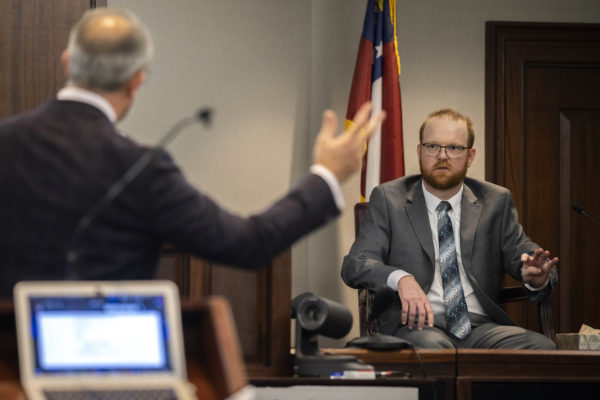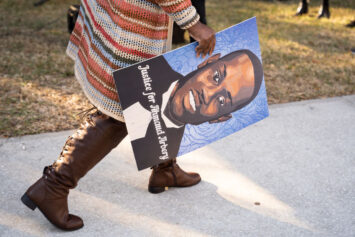One of three white men charged with murder in the killing of Ahmaud Arbery, Travis McMichael, testified in court on Wednesday, Nov. 17, that he was in a “life-or-death situation” when he fired the fatal shot that killed the 25-year-old Black man.
Holding back tears, McMichael said he was thinking of his own son when he pulled the trigger three times last February.

“He had my gun. He struck me. It was obvious that he was attacking me, that if he would have got the shotgun from me, that it was a life-or-death situation,” McMichael said. “And I’m going to have to stop him from doing this. So, I shot.”
McMichael told jurors he and his father “needed to find out what was happening” after he saw Arbery running from a house under construction in the Satilla Shores neighborhood on the Brunswick outskirts in Georgia.
During cross-examination, McMichael told Assistant District Attorney Linda Dunikoski he was just trying to identify the man who had been seen on video on the vacant property when he pursued Arbery. According to court proceedings, McMichael shot Arbery three times during a scuffle over McMichael’s shotgun.
Dunikoski pointed out that McMichael did not have to shoot Arbery.
“You could have just let him go,” Dunikoski said. She also noted that a stranger has the right to not speak with McMichael if they so choose.
Dunikoski queried McMichael to find out how many times he had pulled up behind strangers in the neighborhood to ask what they were doing there. The answer was “never.” The previous day, McMchael say he tried to ask Arbery to stop multiple times and pulled out his shotgun to deter him.
“You know that no one has to talk to anyone they don’t want to talk to, right?” Dunikoski said.
McMichael said he was following social media posts about a string of crimes in the neighborhood that led him to be on the lookout for possible suspects.
After a neighbor’s purse was stolen, he questioned a man who lived under a bridge. He also became aware of boat equipment that was taken from Larry English, the owner of the house under construction. English himself testified saying that his surveillance videos never showed Arbery taking anything.
He spotted Arbery on the vacant property 12 days before the Feb. 23 killing. The responding officer on Feb. 11 showed McMichael a video of Arbery walking inside the home. McMichael told the court Arbery looked calm and nonchalant.
“I wouldn’t think anyone acting normal would do that, and someone who is willing to act like they have a gun … is just, it just sets off the alarms for you,” McMichael said. “It’s just bold. It’s just very bold.”
Another neighbor, Brooke Perez, told the court that she had posted a description of Arbery on Facebook in December 2019. She went into her yard with the handgun on Feb. 11.
“It’s the same guy the last few times. We have him all over camera. Boy, is he fast, and he knows our neighborhood really good,” she wrote.
McMichael said he felt qualified to help capture the person behind the crime because of his Coast Guard training. He said one strategy he learned was to point a gun at a suspect to defuse a situation.
He testified about two occasions when he was able to fend off criminals by brandishing his gun. One of them was an attempted robbery at an ATM in Mississippi. The other was an attempted carjacking. Still, McMichael told the court Arbery did not speak to him or threaten him during their altercation.
McMichael and the two other men on trial for murder in Arbery’s death said they were trying to detain him under Georgia’s citizen’s arrest law.
Before it was reformed earlier this year, the law allowed civilians to arrest someone if they witnessed a crime or had “immediate knowledge” another person had committed one. If that crime was a felony and the suspect attempted to escape, the law also allowed civilians to detain the person suspected of the crime.
McMichael also said he believed he had probable cause to pursue Arbery according to law. Dunikoski contended that McMichael never actually saw Arbery commit a crime, nor did he tell police at the time that he and his father were attempting to make an arrest.
“All he’s done is run away from you,” Dunikoski said. “And you pulled out a shotgun and pointed it at him.”
The defense rested its case Thursday. Closing arguments are expected to begin Monday.
More news from our partners:
